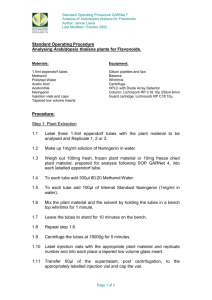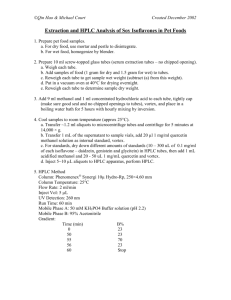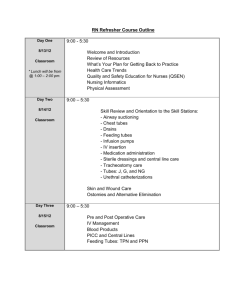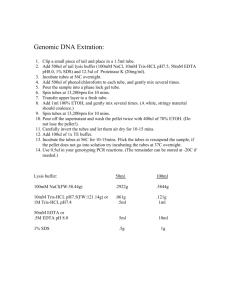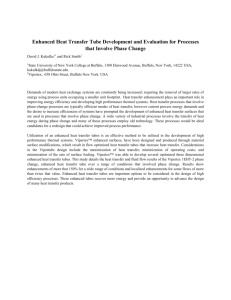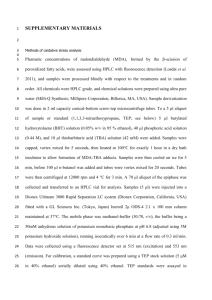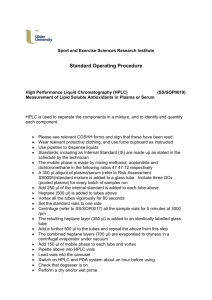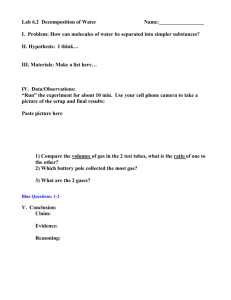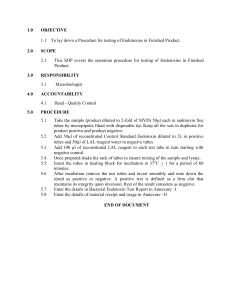SOP for Phenylpropanoid Analysis
advertisement
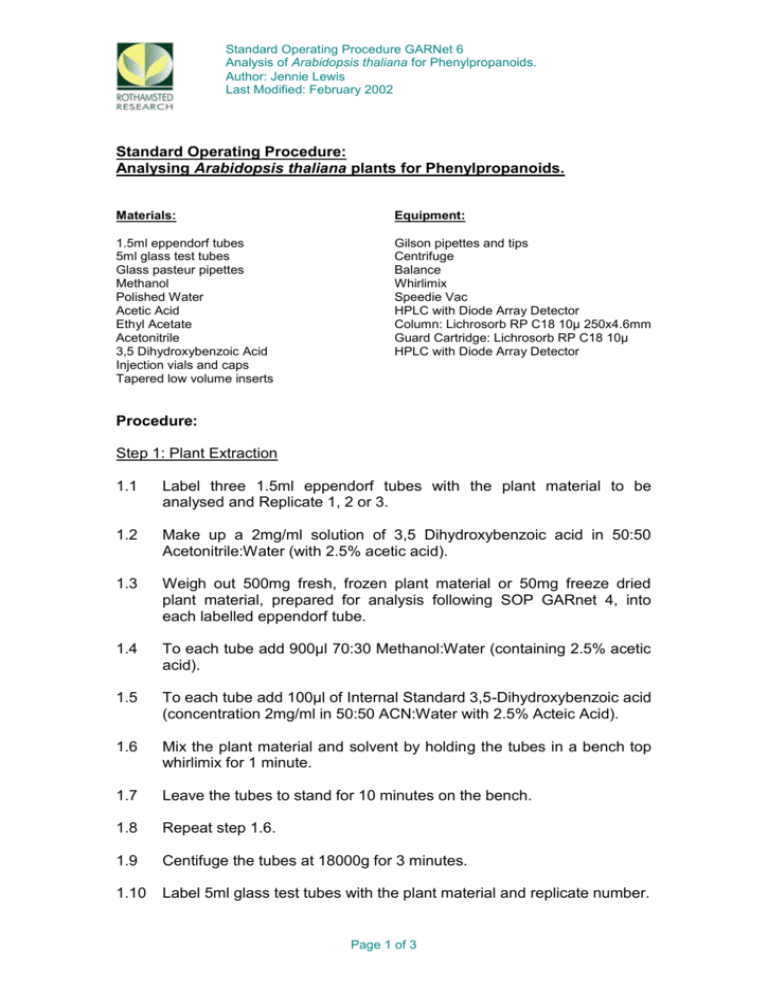
Standard Operating Procedure GARNet 6 Analysis of Arabidopsis thaliana for Phenylpropanoids. Author: Jennie Lewis Last Modified: February 2002 Standard Operating Procedure: Analysing Arabidopsis thaliana plants for Phenylpropanoids. Materials: Equipment: 1.5ml eppendorf tubes 5ml glass test tubes Glass pasteur pipettes Methanol Polished Water Acetic Acid Ethyl Acetate Acetonitrile 3,5 Dihydroxybenzoic Acid Injection vials and caps Tapered low volume inserts Gilson pipettes and tips Centrifuge Balance Whirlimix Speedie Vac HPLC with Diode Array Detector Column: Lichrosorb RP C18 10μ 250x4.6mm Guard Cartridge: Lichrosorb RP C18 10μ HPLC with Diode Array Detector Procedure: Step 1: Plant Extraction 1.1 Label three 1.5ml eppendorf tubes with the plant material to be analysed and Replicate 1, 2 or 3. 1.2 Make up a 2mg/ml solution of 3,5 Dihydroxybenzoic acid in 50:50 Acetonitrile:Water (with 2.5% acetic acid). 1.3 Weigh out 500mg fresh, frozen plant material or 50mg freeze dried plant material, prepared for analysis following SOP GARnet 4, into each labelled eppendorf tube. 1.4 To each tube add 900μl 70:30 Methanol:Water (containing 2.5% acetic acid). 1.5 To each tube add 100μl of Internal Standard 3,5-Dihydroxybenzoic acid (concentration 2mg/ml in 50:50 ACN:Water with 2.5% Acteic Acid). 1.6 Mix the plant material and solvent by holding the tubes in a bench top whirlimix for 1 minute. 1.7 Leave the tubes to stand for 10 minutes on the bench. 1.8 Repeat step 1.6. 1.9 Centifuge the tubes at 18000g for 3 minutes. 1.10 Label 5ml glass test tubes with the plant material and replicate number. Page 1 of 3 Standard Operating Procedure GARNet 6 Analysis of Arabidopsis thaliana for Phenylpropanoids. Author: Jennie Lewis Last Modified: February 2002 1.11 Transfer 500μl of supernantant to the correctly labelled tube. 1.12 Add to the supernatant 1ml distilled water (containing 2.5% acetic acid) and 1ml ethyl acetate. 1.13 Mix the tubes for 1 minute using a bench top whirlimix. 1.14 Leave the tubes on the bench until clear partitioning can be seen. 1.15 Label a second set of 5ml test tubes with the appropriate plant material and replicate number. 1.16 Remove the ethyl acetate layer with a glass pasteur pipette and transfer to the correctly labelled clean tube. Use a clean pipette for each replicate. 1.17 Place the tubes in a speedie vac and run the machine until all the liquid has evaporated, leaving a green residue in the bottom of the tube. This usually take 30 – 60 minutes. 1.18 Reconstitute the samples in 50μl 50:50 ACN:Water (with 2.5% acteic acid). 1.19 Label injection vials with the appropriate plant material and replicate number and into each place a tapered low volume glass insert. 1.20 Transfer the reconstituted samples, with a glass pasteur pipette, to the appropriately labelled injection vial and cap the vial. Step 2: HPLC Analysis 2.1 Make up Mobile Phases A: 2.5% Acetic Acid and B: Acetonitrile. 2.2 Set up the HPLC with a Lichrosorb RP C18, 10μ, 250x4.6mm column with in line guard cartridge. 2.3 Programme the HPLC with the following gradient and flow rate of 1ml/min. Page 2 of 3 Standard Operating Procedure GARNet 6 Analysis of Arabidopsis thaliana for Phenylpropanoids. Author: Jennie Lewis Last Modified: February 2002 Time (minutes) 0 5 7 47 52 54 57 60 % Mobile Phase A 100 83 82 67 0 0 100 100 % Mobile Phase B 0 17 18 33 100 100 0 0 2.4 Set the diode array detector to scan at 250-550nm and to selectively monitor at 332nm. 2.5 Equilibrate the column in 100% Mobile Phase A until a flat base line is maintained. 2.6 Inject 25μl of each prepared sample in to the HPLC system. Page 3 of 3
